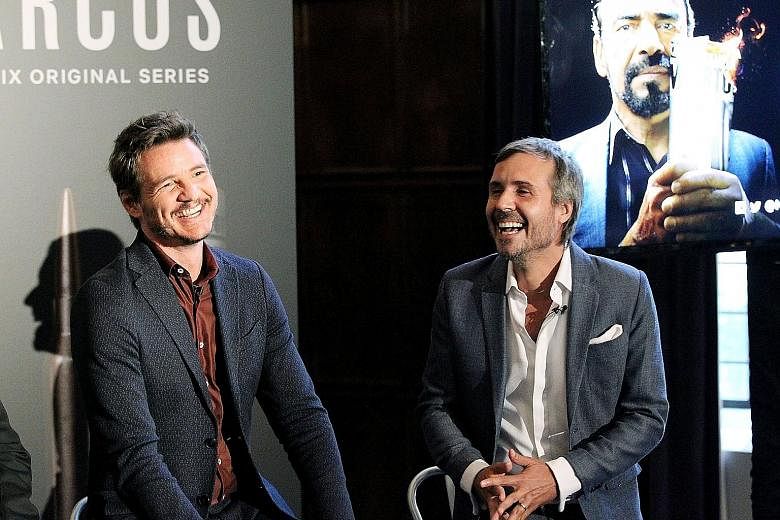With the reggaeton hit Despacito recently becoming the most- streamed song of all time, with more than 4.6 billion plays across all major platforms, the global popularity of Latin American and Hispanic pop culture seems to have hit an all-time high.
But while this has been most obvious in the music industry, where it began with the crossover appeal of Latino pop singers such as Gloria Estefan and Ricky Martin in the 1980s and 1990s, there have been few equivalents on screen, where it is still mostly Englishlanguage films and television shows that find international success.
A notable exception is the Spanish-language Netflix series Narcos, which returned for its third season recently. And the fact that many critics and fans appear to have embraced it has been heartening to Pedro Pascal, the show's bilingual Chilean-American star.
At a recent press event for the series in Bogota, Colombia, the 42-year-old actor tells The Straits Times that it was a bold move to film the drama - based on the true story of the Medellin and Cali drug cartels - almost entirely in Spanish .
"I think the original intention was that it would be in English, (with) this kind of accented, arbitrary Latino accent and Colombian characters in Colombia speaking English to each other," says the actor, who plays Javier Pena, a United States Drug Enforcement Administration agent determined to take down Colombia's drug kingpins.
"And then Netflix said no, 'Spanish speakers need to speak in Spanish', which is an amazing thing. Because to be able to experience a certain amount of authenticity over any era of history is a cool thing.
"So there are episodes where it's three-quarters in Spanish and with English narration to help outsiders along," explains Pascal, who is best known for his 2014 stint on Game Of Thrones, where he played fan favourite Prince Oberyn Martell.
Yet he is unsure if the success of Narcos has made Hollywood more willing to experiment with Spanish-language content.
"I don't know if it's changing things; I just know that it worked for this show, that it shows it can be done and that it just makes for better storytelling if cultural representation is done well."
It is not like this has not been demonstrated before, he points out. "I remember there was an entire episode of (the 2004 to 2010 supernatural drama) Lost, where we went back in time with the Korean couple and that whole episode was in Korean, with subtitles - and that was a major network.
His co-star Pepe Rapazote, a 47-year-old Portuguese actor who speaks five languages, feels like Narcos is breaking new ground.
"It's the first world-renowned show with 90 per cent of the dialogue in Spanish and it's been better for the Spanish language than all the money poured into Cervantes Institutes around the world," he says, referring to the network of agencies created by the government of Spain to promote its language and culture.
After watching the show, "everyone's saying a few words and sentences now in Spanish".
He believes the driving force behind this is the fact that Netflix has global ambitions. "No one would ever be ballsy enough to do it except for Netflix because Netflix is around the world and now they want to conquer every Spanish- speaking market. There would be no big studio doing it in the US. And I do have some sort of Latino pride in that," he says.
Asked if he believes the success of Narcos and recent Latino pop songs heralds a new phase in the globalisation of Latino and Hispanic culture, Pascal says: "I can only hope."
Pointing to Oscar-winning filmmakers Alejandro Inarritu (The Revenant, 2015, Birdman, 2014) and Alfonso Cuaron (Gravity, 2013), he notes: "Two of the greatest directors in the world are from Mexico. And I can only hope that Narcos is again something that is introducing people to Latin talent."
He prays that this is more than a passing fad. "I hope that it's in fashion, but I don't like the idea of it being in fashion because it just is real - it's an inclusiveness that's part of our reality, and therefore it should be represented as much as possible in pop culture, whether in film, TV or what have you. And if Narcos can help that along, that's great."

